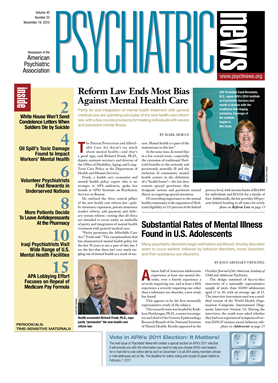Did you ever think about pursuing psychiatry in a far-off place for a few weeks or months?
Two psychiatrists who have acted on that thought reported their experiences at the Canadian Psychiatric Association meeting in Toronto in September at a session titled “International Initiatives and Opportunities for Canadian Psychiatrists and Psychiatric Residents.”
The psychiatrists were Raymond Tempier, M.D., a professor of psychiatry at the University of Saskatchewan, and Emiko Moniwa, M.D., a Vancouver psychiatrist.
One winter, Tempier worked in the Caribbean, on the island of Dominica, where there is only one psychiatrist for some 75,000 residents. This psychiatrist earns a living from a private practice, but then works pro bono for the poor and homeless on the island. Tempier joined him on his rounds.
“He would give shots of antipsychotics to the poor and homeless with schizophrenia and tell them, ‘This is your vaccination,’” Tempier reported. “Working on this island for a while would be a wonderful experience for a psychiatry resident, I think [both to help people in desperate need of psychiatric care and as a learning experience]. The situation is similar on the Caribbean island of Montserrat.”
Moniwa worked in Ethiopia for five weeks during her fourth year of residency as part of a University of Toronto program for psychiatry residents.
“One of the reasons I did it,” she explained, “is because I love to travel. But there were also concerns—a new culture, a need to be flexible, being away from home with few supports. I had to use older medications, learn a new model of care, and deal with language barriers. And the conditions were modest and basic. A number of people with severe mental illness were kept in chains. Some had reportedly gone off to the desert and had died.”
But since there were only eight psychiatrists in all of Ethiopia when the program started, Moniwa felt that her presence, even for such a short time, made a difference in the lives of mentally ill people and that she learned a lot from the experience.
“The first lesson I learned was a lesson in humility,” she said. “I learned that even with few resources, you can provide good care. I learned about the effectiveness of some of the older medications that I otherwise would not have used. I learned about the importance of kindness. I watched and learned as an Ethiopian psychiatrist calmed a disruptive patient with a kind hand instead of restraints.”
Moniwa also worked in New Zealand for six months after she completed her psychiatry residency. It was similar to working in Vancouver, she reported, except that she got to work closely with the indigenous population. The pay was not as high as in Canada, but her flights, accommodations, and insurance were paid for.
“[The country also has] a huge need for psychiatrists, so you can work there for as long as you want,” she noted.
Working in another highly underserved area—the Yukon—either short or long term, is another possibility, Moniwa said. “Psychiatrists working there receive generous remuneration.”
Tempier and Moniwa named several Web sites for psychiatrists interested in working abroad.
•.
Psychiatrists can volunteer for the International Medical Corps and work two to eight weeks in a foreign country in response to an emergency. A stipend, housing, and insurance are provided. The Web site is <
www.internationalmedicalcorps.org>.
•.
Doctors Without Borders wants psychiatrists who have experience in trauma, HIV and AIDS, tuberculosis, or sexual violence. The Web site is <
www.msf.ca>.


